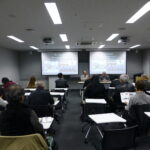In January 2016, the Hiroshima Peace Institute (HPI) launched its first Public Lecture Series in English at the HCU Satellite Campus. In this new lecture series 4 HPI researchers presented a series of talks in English, focusing on intriguing topics in their fields of expertise. All lectures were free and open to the public.

Lecture 1
Date & Time: January 15, 2016, from 6 p.m. to 8 p.m.
Topic: “Democracy and Peace in Myanmar since the 2010 Elections”
Lecturer: Narayanan Ganesan, Professor, Hiroshima Peace Institute, Hiroshima City University
Abstract: The Thein Sein government that was elected into power in 2010 has introduced a number of sweeping changes in Myanmar. This includes a better working relationship with the political opposition and ethnic groups, liberalizing the mass media and beginning a dialogue process with the country’s ethnic insurgent groups that culminated in the October 2015 Nationwide Ceasefire Agreement that was signed with 8 of the country’s 16 ethnic armies. The talk will highlight the evolving political changes and challenges.
Profile of the lecturer: Ganesan’s teaching and research interests are in Southeast Asian politics and foreign policy with a focus on issues that generate interstate and intrastate tensions. His most recent major publications in 2015 include the edited books Bilateral Legacies in East and Southeast Asia (Singapore: Institute of Southeast Asian Studies) and State-society Relations and Democracy in Southeast Asia and Turkey (Ankara: Konrad Adenauer Stiftung).
Lecture 2
Date & Time: January 22, 2016, from 6 p.m. to 8 p.m.
Topic: “Highlighting the G7 Lübeck Statement on Non-Proliferation and Disarmament”
Lecturer: Yasuhito Fukui, Associate Professor, Hiroshima Peace Institute, Hiroshima City University
Abstract: In April 2016, the G7 Foreign Ministers’ Meeting will be held in Hiroshima and one of the final documents seems to be the non-proliferation and disarmament statement. The basis for its diplomatic process, known as “NPDG (Non-Proliferation Directors Group),” is the statement adopted last year in Lübeck. This lecture focuses on its stocktaking of the substantial issues in the Lübeck statement and works to seek the forward-looking aspects to be contained in the statement which will be agreed in Hiroshima.
Profile of the lecturer: Born in 1964 in Hyogo Prefecture. LL.D. (Docteur en droit) from Université Paris 1 (Panthéon-Sorbonne). He specialises in international public law, especially international disarmament law, international humanitarian law, and so forth. His major publication is, Gunshuku Kokusaiho no Kyoka (Strengthening the International Disarmament Law) published by Shinzansha Publisher Co., Ltd. in February 2015.
Lecture 3
Date & Time: January 29, 2016, from 6 p.m. to 8 p.m.
Topic: “Japanese Perceptions of Territorial Disputes: Opinion Poll Surveys in the Southwestern Part of Japan”
Lecturer: Mikyoung Kim, Associate Professor, Hiroshima Peace Institute, Hiroshima City University
Abstract: This research finds a weak overall causal association between domestic state of affairs and territorial perceptions. The public opinion on territorial claims remains more or less the same largely independent of domestic socio-economic conditions. This observation leads to a call to revise the conventional conflict cycle theory (i.e., status quo--->provocation---> rise of tension---> conflict relaxation) in order to reflect more of simultaneous and interactive nature of inter-state conflict (i.e., action {tension/status quo/reconciliation} --->reaction {tension/status quo/reconciliation}).
Profile of the lecturer: Mikyoung Kim is Associate Professor at the Hiroshima City University - Hiroshima Peace Institute in Japan. She has published refereed articles and book chapters on memory, reconciliation, and human rights in East Asia. Her books include Northeast Asia’s Difficult Past: Essays in Collective Memory (Palgrave Macmillan, 2010; with Barry Schwartz), Securitization of Human Rights: North Korean Refugees in East Asia (Praeger, 2012) and Routledge Handbook of Memory and Reconciliation in East Asia (Routledge, 2015). Kim served as the editor of North Korean Review.
Lecture 4
Date & Time: February 5, 2016, from 6 p.m. to 8 p.m.
Topic: “The Global Hibakusha Project: Connecting Young People in Radiation Affected Communities”
Lecturer: Robert Jacobs, Associate Professor, Hiroshima Peace Institute, Hiroshima City University
Abstract: The Global Hibakusha Project has recently concluded its 2nd workshop, held here in Hiroshima. The project trains young people in radiation-affected communities in oral history methodology. The workshops have two goals, supporting the gathering of hibakusha testimony by young people within the community, and also to link Hiroshima & Nagasaki with nuclear test site communities through networking young people. To date, workshop participants have come from Japan, the Marshall Islands, Kazakhstan and Australia. This talk will detail the work of the Global Hibakusha Project, and discuss the outcomes of the recent Hiroshima workshop.
Profile of the lecturer: Jacobs is an American historian of the social and cultural aspects of nuclear technologies. His recent work focuses on a global cross-cultural study of radiation affected communities. His book co-authored with Urs Heftrich, Bettina Kaibach and Karoline Thaidigsmann, eds. Images of Rupture in Civilization Between East and West: The Iconography of Auschwitz and Hiroshima in Eastern European Arts and Media (Köln: Böhlau, 2016) is forthcoming.
Venue:
Seminar Room 2, Satellite Campus, Hiroshima City University
4-1-1 Otemachi, Nakaku, Hiroshima
9F Otemachi Heiwa Building
